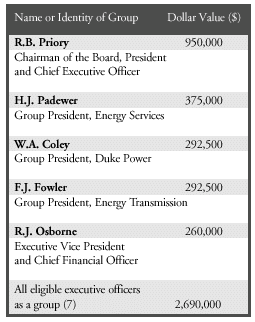|
| Proposal 1 - Election of Directors |
|
| Proposal 2 - Ratification of Deloitte & Touche LLP as Duke Energy's Independent Auditors for 2000 |
|
| Proposal 3 - Approval of the Duke Energy 2000 Policy Committee Short-Term Incentive Plan |
|
| Proposal 4 - Use of Mixed Oxide Fuel in Nuclear Reactors |
|
| Proposal 5 - Limits on Outside Board Positions for Directors |
PROPOSAL 3:
Approval of the Duke Energy 2000 Policy Committee Short-Term Incentive PlanThe Board of Directors recommends a vote FOR this proposal.
The Duke Energy 2000 Policy Committee Short-Term Incentive Plan is designed to advance Duke Energy’s interests by rewarding members of the Policy Committee when corporate performance reaches certain predetermined levels. The Plan will be administered by the Compensation Committee of the Board of Directors. Awards may be granted only to members of the Policy Committee (currently numbering seven). The Policy Committee consists of senior executive officers involved in corporate strategic planning and in determining policies and management principles for the entire Duke Energy enterprise.
The full text of the Plan was filed electronically with the SEC with this proxy statement. A brief description of the material features of the Plan is presented here, but you are encouraged to read the full Plan if you need more information.
Material Features of Duke Energy 2000 Policy Committee Short-Term Incentive Plan. Before the end of the first quarter of each year, the Compensation Committee will establish performance targets and corresponding target awards for each Policy Committee member for that year. The Compensation Committee may establish a performance target as a specified level of a business measure and provide that the performance target will be determined by eliminating the financial effects of specified transactions or occurrences. If the Compensation Committee intends that awards qualify as performance-based compensation under Section 162(m) of the Internal Revenue Code (described below), the performance targets may track any of the following business measures, for Duke Energy or any of its subsidiaries or business units:
* earnings per share
* total shareholder return
* stock price increase
* return on equity
* return on capital
* EBIT (earnings before interest and taxes)
* cash flow
* EVA (economic value added)
* SVA (shareholder value added)
* revenuesAchievement of the business measures listed above may be determined on a stand-alone basis or as compared to a peer group. Section 162(m) limits the deductibility of annual compensation over $1 million paid to certain employees. However, this limit does not apply to qualifying performance-based compensation. Alternatively, the Compensation Committee may establish strategic objectives, instead of business measures, as performance targets for awards that it does not intend to qualify as performance-based compensation under Section 162(m). Awards will be payable in cash, and the total amount of all award payments to any Policy Committee member will not exceed $4,000,000 for any given year.
Soon after the close of each year, the Compensation Committee will certify in writing the extent to which the performance targets have been achieved. If any targets have been achieved, the Compensation Committee will determine for each Policy Committee member the amount of the award that has been earned, based on a predetermined formula. The Compensation Committee may reduce the amount of any of these awards based upon its assessment of individual performance, the failure of the Policy Committee member to remain employed by Duke Energy or its subsidiaries throughout the year, or for any other reason. The Compensation Committee may allow members of the Policy Committee to defer payment of all or part of any awards.
If the shareholders approve the Plan, the Plan will replace the current Duke Energy Policy Committee Short-Term Incentive Plan, and the Plan will continue in effect until the Board of Directors terminates it. The Compensation Committee may amend or modify the Plan as it sees fit. No amendment or modification will be effective without Board of Director or shareholder approval, however, if that approval is required to comply with the requirements for performance-based compensation under Section 162(m).
2000 Policy Committee Plan Benefits. Subject to shareholder approval of the Plan, the Compensation Committee has granted the following target awards for the year 2000 under the Plan, with performance targets based on Duke Energy’s earnings per share for that year:
The actual awards may be more or less than these target awards, depending upon differences between actual earnings per share and the earnings per share performance target.



